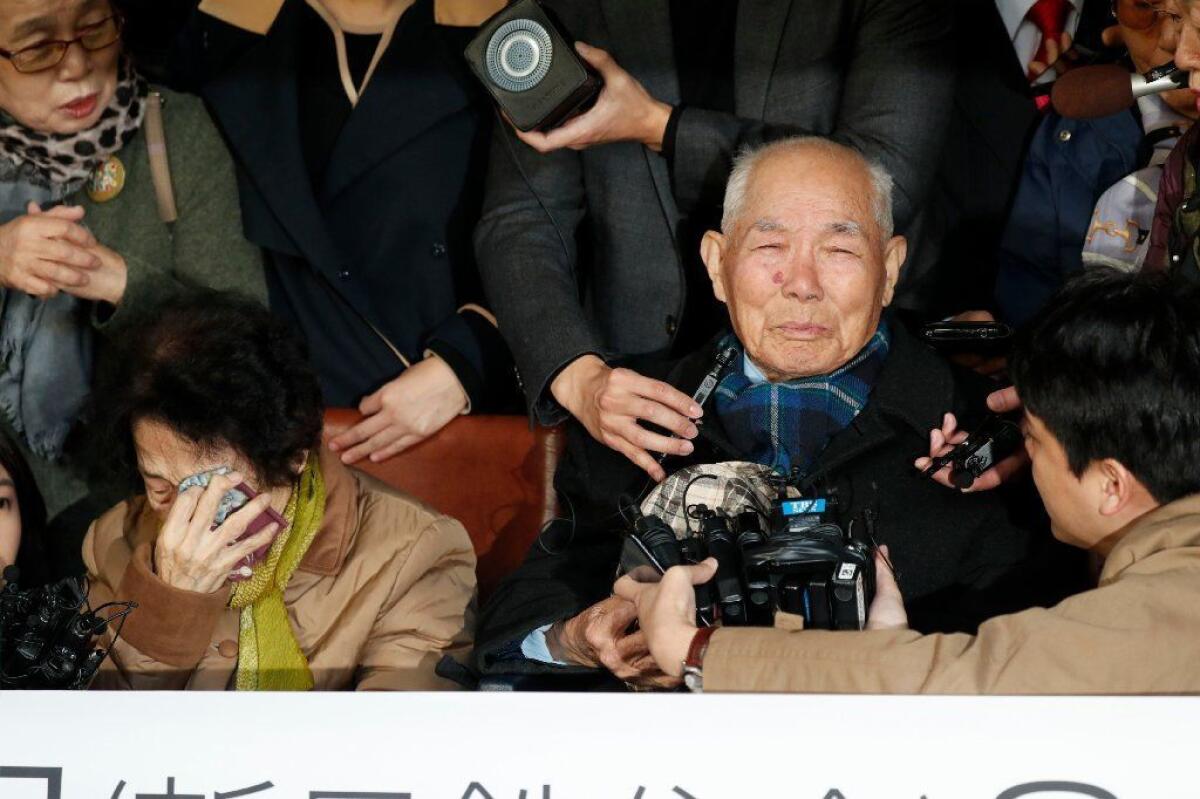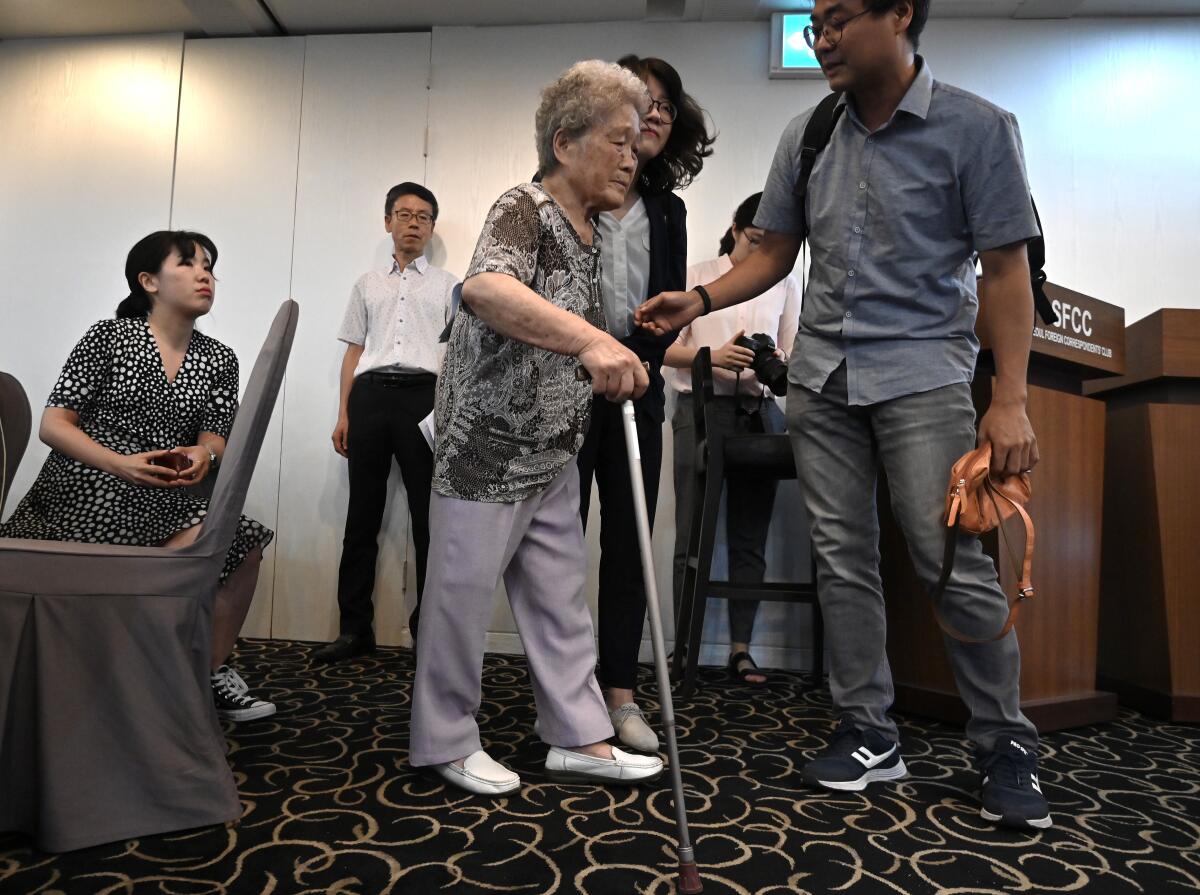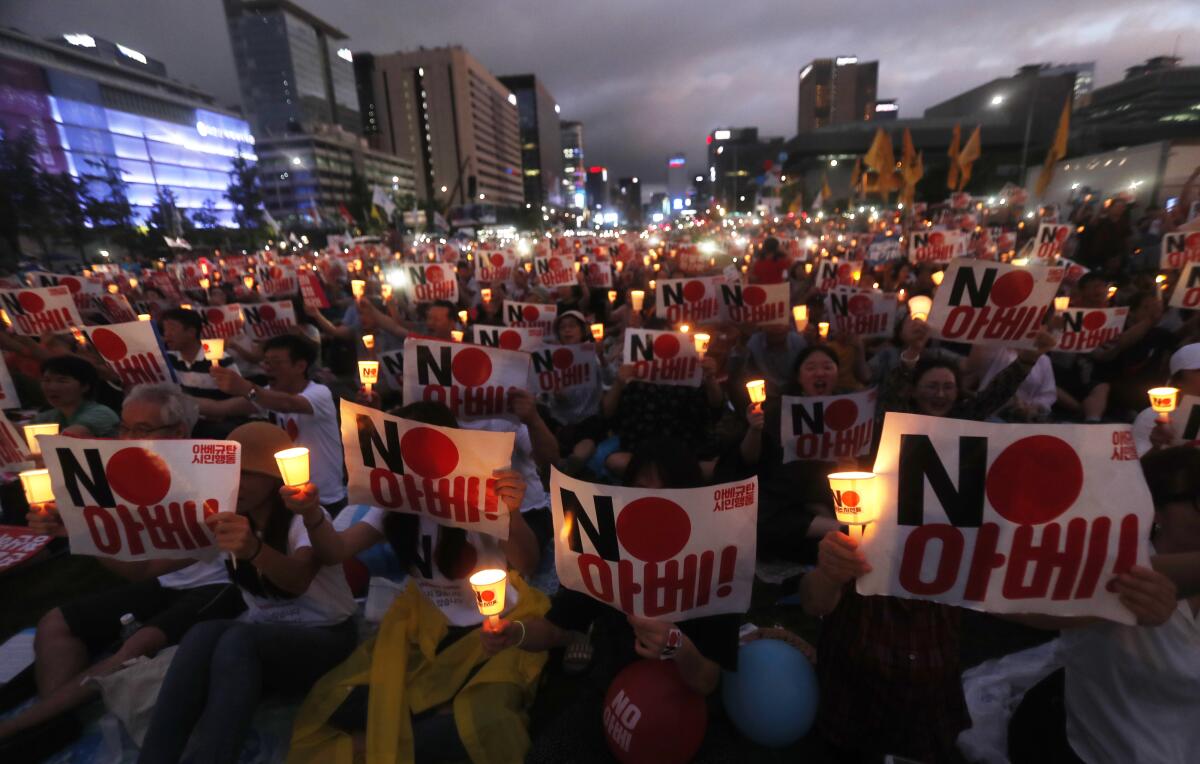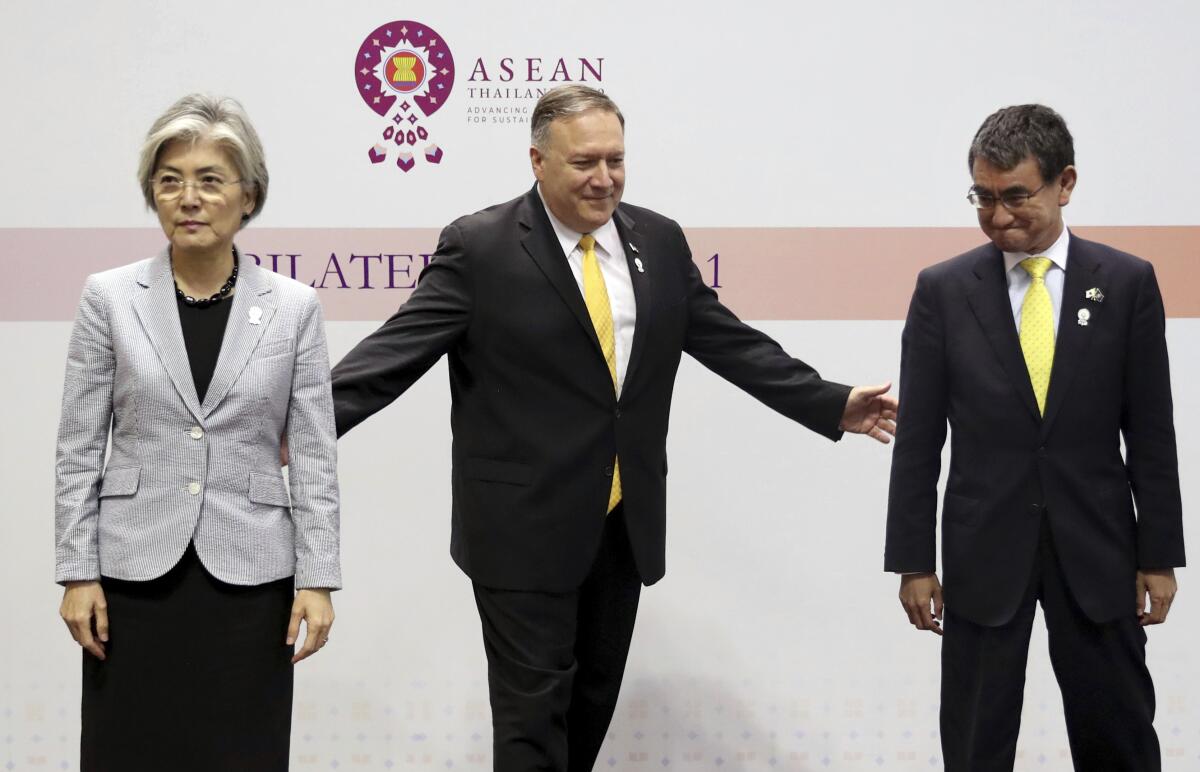Japan, Korea and the messy question of how to pay for historic wrongs

She was just 13 in 1945 when she was forced to toil for months in a factory servicing the desperate last gasp of Japan’s war effort. Today, Kim Jeong-ju can point to many culprits to blame.
There was the elementary school teacher who lied and told her going to Japan would mean better schooling and opportunities. The supervisors at the factory where she worked long hours with meager rations, where she had to stand atop two apple crates to reach the machinery. The multibillion-dollar corporation that profited off her labor to supply the Japanese military, and continues to thrive to this day.
There’s the Japanese government, which colonized Korea in 1910 and conscripted hundreds of thousands of Koreans to serve its war effort at the height of World War II. The South Korean dictatorship that agreed to a $300-million settlement from Japan in 1965 but did nothing to compensate individual victims of forced labor, including Kim and her sister.
“I was really, really hungry. We were like slaves, caged in by barbed wire,” Kim, now 88, said this week, telling a story that has become almost rote in two decades of speaking before Japanese and Korean courts, lawmakers and press in her fight to get compensated for the wartime labor under imperial Japan. For the arduous work and mistreatment, she said, “I never received a penny.”
More than seven decades later, the dispute over who should pay for the suffering of Kim and others like her is at the heart of a downward spiral in relations between South Korea and Japan that has spawned a trade war and ignited massive protests and boycotts in South Korea.

A South Korean court said the Japanese companies should pay. Japan says it’s up to the South Korean government to compensate them, based on the terms of the 1965 agreement.
Amid the tensions, since July, two South Korean men have set themselves on fire near the Japanese embassy in Seoul in protest and died from the injuries. Japanese clothing and beer sales have plummeted and airlines have scrapped routes to Japan due to decreased travel. An $80-billion bilateral trade relationship is in jeopardy, as is a military information-sharing agreement between the two countries that has been valuable for the U.S. and its allies against the North Korean threat.
While clashes over historical responsibility are a perennial thorn in South Korea-Japan relations, the messy question of how and by whom history’s dues should be paid across generations is not unique to East Asia. From the newly invigorated reparations debate in the U.S. to the rights of Jews expelled from Spain in 1492, in lawsuits seeking compensation for Kenya’s Mau Mau from the British, and Armenians from the Ottoman Empire, unsettled claims of historical wrongs are increasingly cropping up around the world.
“People say, this happened decades or hundreds of years ago; people involved are no longer alive. But these are not so much issues of monetary compensation to individuals, they’re profound issues of identity,” said Daniel Sneider, a lecturer in international policy at Stanford University and a longtime researcher of issues of historical memory in East Asia. “That’s what people are seeking more than anything else ... they’re seeking an acceptance of what the past meant, and their own sense of historical memory.”
Polls in both the U.S. and Japan show the idea of paying out present-day dollars for the wrongs of past generations isn’t popular in either country, said Tom Le, an assistant professor of politics at Pomona College.
“People in the modern day feel like they’re not directly responsible,” he said.
In the U.S., Senate Majority Leader Mitch McConnell pooh-poohed the idea of reparations for slavery at a June congressional hearing, saying: “No one currently alive was responsible for that.”
That will soon be the case in Japan and South Korea, with the war and Japan’s occupation of the Korean peninsula having ended 74 years ago Thursday. Only a few dozen of the estimated 900,000 Koreans drafted as laborers are alive and actively pursuing claims against their wartime employers. Many of the responsible companies have since been dissolved, merged or sold, complicating the cases.
But the passage of time has done little to lessen the emotions riding on the colonial legacy.

The latest flare-up began with South Korea’s top court ruling in two cases in late 2018 that individual victims could seek damages from Japanese companies Nippon Steel and Mitsubishi Heavy Industries, and go after their assets in South Korea.
The rulings reversed earlier decisions by Japanese and some South Korean courts that those claims were settled in 1965 when South Korea and Japan normalized relations. At the time, South Korea was paid a $300-million grant and $200 million in loans — about $4 billion today — and signed a treaty stating claims of property and rights were to be “settled completely and finally.”
South Korea’s supreme court, though, found that the treaty didn’t cover individuals’ rights to seek compensation for crimes against humanity, and said the victims should receive about $80,000 each.
Japan, furious over the South Korean government’s handling of the forced labor cases, has accused Seoul of “subverting the world order established after World War II.” Japanese officials have accused the liberal government in Seoul of refusing to adhere to a valid international treaty, saying South Korea cannot be a reliable partner if each administration overturns agreements signed by previous governments.
“These decisions are extremely regrettable and totally unacceptable,” Japan’s foreign minister Taro Kono said in a statement last November, calling the rulings a breach of international law and saying Japan will “examine all possible options” to protect the business interests of Japanese companies. “The decisions completely overthrow the legal foundation of the friendly and cooperative relationship that Japan and the Republic of Korea have developed since the normalization of diplomatic relations in 1965.”
They also point to South Korea’s reneging on a 2015 deal that was to be a final apology and financial settlement on the issue of South Korean “comfort women,” who served in military brothels during World War II. South Korean President Moon Jae-in has said the deal was flawed because it didn’t properly consult victims and dissolved the 1-billion-yen fund paid by Japan to compensate the women.
Citing issues of trust, Japan in July announced measures to restrict exports of materials to South Korea critical to its semiconductor industry and removed South Korea from a “white list” of trusted trading partners, set to take effect Aug 28. South Korea has retaliated by striking Japan from its own list of preferred trade partners.
Japan may be concerned that recognizing the South Korean court ruling could open the flood gates for people elsewhere in Asia wanting to relitigate their own cases against the acts of imperial Japan. Chinese laborers have also sued in Japanese courts, with mixed results. The Korean decision also awarded damages to surviving heirs of plaintiffs who died while the case was making its way through the courts.
“If Japan loses under 1965 deal, that’s going to open Pandora’s box,” Le of Pomona said. “That’s why [Prime Minister Shinzo] Abe wants to nip it at the bud.”

Germany settled its own cases involving the usage of forced labor during World War II in 1999 after years of litigation and contentious negotiations in which the U.S. was heavily involved. German companies and the German government paid into a $5-billion fund which made payments to 1.66 million people in almost 100 countries.
Experts said the U.S. should also be actively involved in coming up with a solution to the impasse over the forced labor cases between Korea and Japan because of the central role it played in how Japan’s conduct was dealt with after the war’s end.
“I don’t think Japan made sufficient atonement after the war or was required to make those kinds of reparations ... because the U.S. saw Japan as a bulwark against communism,” said Timothy Webster, professor of transnational law and director of Asian legal studies at Case Western Reserve University in Ohio. “It might’ve been great for U.S. geopolitics, but it obscured suffering of millions of Koreans and millions of Chinese.”
Also complicating the situation is South Korea’s domestic politics and its own wrestling with the legacy of a strongman who was in power from 1961 to 1979. Park Chung-hee used the funds received from Japan to lay the foundation of the rapid industrialization that made today’s South Korea possible, yet cracked down on dissent and civil liberties.
“The 1965 treaty was between Japan and an authoritarian regime in Korea that lacks legitimacy today,” said Celeste Arrington, professor of comparative politics at George Washington University.
As for Kim, the elderly survivor, she says what she wants more than anything is an apology from Abe for her and her sister, who lost part of her finger while working in Japan.
She once more took to the streets in central Seoul on Thursday, marching with protesters critical of Japan.
More to Read
Sign up for Essential California
The most important California stories and recommendations in your inbox every morning.
You may occasionally receive promotional content from the Los Angeles Times.











